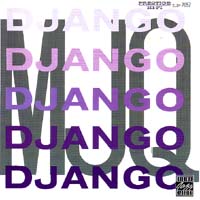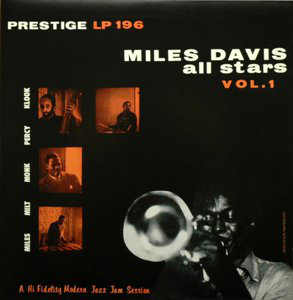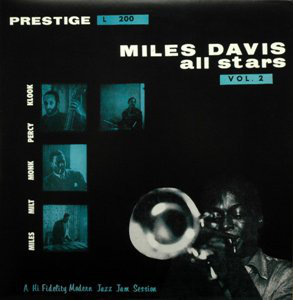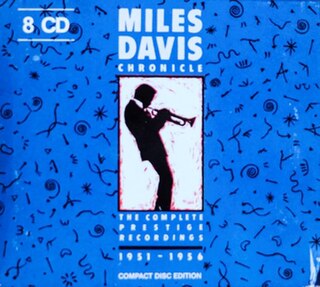
Milton Jackson, nicknamed "Bags", was an American jazz vibraphonist, usually thought of as a bebop player, although he performed in several jazz idioms. He is especially remembered for his cool swinging solos as a member of the Modern Jazz Quartet and his penchant for collaborating with hard bop and post-bop players.

Kenneth Clarke Spearman, nicknamed Klook, was an American jazz drummer and bandleader. A major innovator of the bebop style of drumming, he pioneered the use of the ride cymbal to keep time rather than the hi-hat, along with the use of the bass drum for irregular accents.

Percy Heath was an American jazz bassist, brother of saxophonist Jimmy Heath and drummer Albert Heath, with whom he formed the Heath Brothers in 1975. Heath played with the Modern Jazz Quartet throughout their long history and also worked with Miles Davis, Dizzy Gillespie, Charlie Parker, Wes Montgomery, and Thelonious Monk.

Arthur S. Taylor Jr. was an American jazz drummer, who "helped define the sound of modern jazz drumming".

'Round About Midnight is an album by jazz trumpeter Miles Davis that was originally released by Columbia Records in March 1957. It was Davis' first album with Columbia.
"'Round Midnight" is a 1943 composition by American jazz pianist Thelonious Monk that quickly became a jazz standard and has been recorded by a wide variety of artists. A version recorded by Monk's quintet was added to the Grammy Hall of Fame in 1993. It is one of the most recorded jazz standards composed by a jazz musician.

Walkin' is a Miles Davis compilation album released in March 1957 by Prestige Records. The album compiles material previously released on two 10 inch LPs in 1954 (Miles Davis All-Star Sextet and Side One of Miles Davis Quintet, dropping "I'll Remember April" from Side Two and replacing it with the previously unreleased "Love Me or Leave Me" recorded at the same session. Here credited to the "Miles Davis All-Stars", the songs were recorded on 3 April and 29 April 1954 by two slightly different groups led by Davis. Both sessions were recorded at Rudy Van Gelder's home studio.

Bags' Groove is a jazz album by Miles Davis, released in 1957 by Prestige Records, compiling material from two 10" LPs recorded in 1954, plus two alternative takes.

Miles Davis and Milt Jackson Quintet/Sextet, also known as Quintet/Sextet is a studio album by trumpeter Miles Davis and vibraphonist Milt Jackson released by Prestige Records in August of 1956. It was recorded on August 5, 1955. Credited to "Miles Davis and Milt Jackson", this was an "all-star" session, and did not feature any of the members of Davis's working group of that time. Alto saxophonist Jackie McLean appears on his own compositions “Dr. Jackle” and “Minor Apprehension”.

Django is an album by the Modern Jazz Quartet, first released on 12-inch LP in 1956.
Julius Watkins was an American jazz musician who played French horn. Described by AllMusic as "virtually the father of the jazz French horn", Watkins won the Down Beat critics poll in 1960 and 1961 for Miscellaneous Instrument.
Jazz pianist Thelonious Monk's first sessions as a bandleader were recorded between 1947 and 1952, and released on Blue Note records as a series of 78 RPM singles. These singles were then compiled in later years—with additional performances from the sessions—into long-playing album formats. As Monk's reputation and fame grew, the sessions were recompiled again and again into more complete configurations. This article details various releases of these sessions.

Wizard of the Vibes is a Blue Note Records compilation of performances by jazz vibraphonist Milt Jackson. The sessions were the work of The Thelonious Monk Quintet and The Modern Jazz Quartet plus Lou Donaldson. The album has been recompiled and expanded three additional times, with various tracks from these sessions added and deleted.
"Bags' Groove" is a jazz composition by Milt Jackson. It was first recorded by the Milt Jackson Quintet on April 7, 1952 for Blue Note Records, later released on Wizard of the Vibes. Lou Donaldson, John Lewis, Percy Heath and Kenny Clarke were on that date. Next was the Mat Mathews quintet with Herbie Mann, Bud Powell, Mat Mathews again, a bootleg version by the Modern Jazz Quartet, the Lighthouse All-Stars, bassist Buddy Banks' quartet and then Jay Jay Johnson and Kai Winding. Other important recordings include those by Ray Bryant, Oscar Peterson, Al Haig, George Russell, Mal Waldron.

Monk is a 1956 compilation album by jazz pianist and composer Thelonious Monk, featuring material recorded from 1953 to 1954 for the Prestige label and performed by Monk with two quintets, one featuring Julius Watkins, Sonny Rollins, Percy Heath, and Willie Jones and one featuring Ray Copeland, Frank Foster, Curly Russell, and Art Blakey. It was originally titled both Thelonious Monk [on its 1956 cover] and Thelonious Monk Quintets [on its labels]. Over the following decade, it was also re-released as Wee See and The Golden Monk The most common cover art, is 1958 revision, designed by Reid Miles.

Thelonious Monk and Sonny Rollins is a compilation album by jazz pianist and composer Thelonious Monk and saxophonist Sonny Rollins released in 1956 by Prestige Records. The tracks on it were recorded in three sessions between 1953 and 1954. While this is its original title, and its most consistent title in its digital re-releases, it was also released on Prestige as Work! and The Genius Of Thelonious Monk, with alternative covers.
The following is the discography of American jazz pianist and composer Thelonious Monk (1917–1982).

Miles Davis All Stars, Volume 1 is a 10 inch LP album by Miles Davis, released by Prestige Records. The two side-long tracks on this LP, and two others, were recorded at Rudy Van Gelder's Studio, Hackensack, New Jersey, on December 24, 1954. This was the first of two 10" LPs sourced from the same session, which featured vibraphonist Milt Jackson, pianist Thelonious Monk, bassist Percy Heath and drummer Kenny Clarke. Jackson, Heath and Clarke were three quarters of the Modern Jazz Quartet at this time.

Miles Davis All Stars, Volume 2 is a 10-inch LP album by Miles Davis, recorded in 1954 for Prestige Records. The two side-long tracks on this LP, and two others, were recorded at Rudy Van Gelder's Studio, Hackensack, New Jersey, on December 24, 1954. This was the second of two 10" LPs sourced from the same session, which featured two of Davis’s major be-bop contemporaries: pianist/composer Thelonious Monk and vibraphonist Milt Jackson, along with the same rhythm section that had been used on Davis's other recent albums - bassist Percy Heath and drummer Kenny Clarke. Jackson, Heath and Clarke were three-quarters of the Modern Jazz Quartet at this time.

Chronicle: The Complete Prestige Recordings 1951–1956 is a box set of 8 CDs with compiled recordings of the American jazz trumpeter and composer Miles Davis, made in sessions between 1951 and 1956 for Prestige Records. It was issued in 1988. The box set contains a 64-page illustrated booklet that includes rare photographs, full discographical details, and an analysis of each session by Dan Morgenstern, Director of the Institute of Jazz Studies at Rutgers University. It is a re-release of the 12 vinyl discs records on 8 CDs in 1980.















